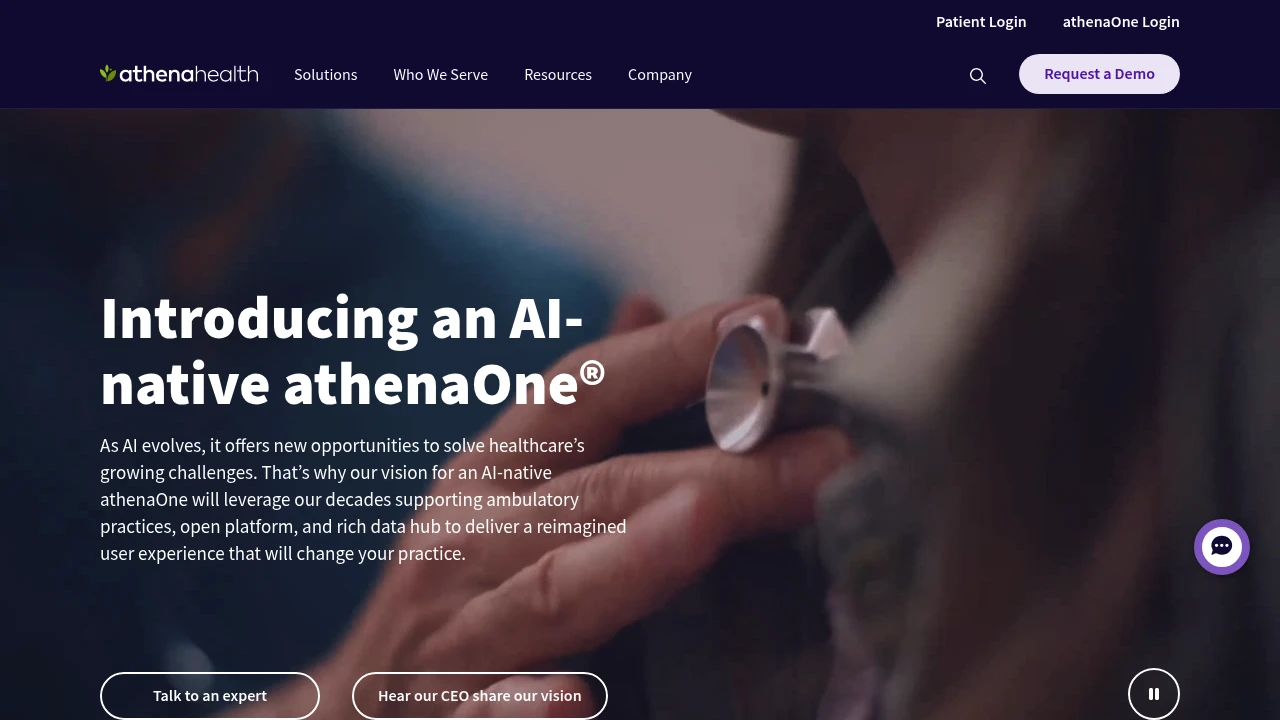Athenahealth
Cloud-based EHR, practice management, medical billing, patient engagement, and services platform for ambulatory practices, specialty clinics, and healthcare organizations looking to operate on a connected provider network.

Frequently asked questions about athenahealth
What is athenahealth used for?
athenahealth is used for EHR, practice management, and revenue cycle management. Providers use it to capture clinical documentation, manage schedules and billing, and engage patients through portals and communications. The platform also supports analytics and network-based benchmarking to inform operations and financial performance.
How much does athenahealth cost per user or per provider?
athenahealth offers competitive pricing plans designed for different team sizes. Specific per-user or per-provider costs depend on the modules selected (EHR, RCM, patient engagement), whether you choose managed billing, and contract terms; contact athenahealth via their pricing page for a tailored quote. Visit their official pricing page for the most current information.
Does athenahealth integrate with third-party applications?
Yes, athenahealth supports integrations via APIs and a developer program. The platform offers RESTful and FHIR-compatible endpoints for scheduling, clinical data, and billing, and a marketplace for certified third-party apps. Developers can review the integration documentation and request sandbox access through the athenahealth developer portal.
Can athenahealth help with medical billing and revenue cycle management?
Yes, athenahealth offers both software and managed billing services for RCM. Practices can choose to use the billing module in-house or contract athenahealth’s managed services for claim submission, denial appeal, and collections, with contract terms typically reflecting the chosen service model.
Is athenahealth HIPAA-compliant and secure?
Yes, athenahealth maintains industry-standard security and compliance controls. The platform operates under HIPAA safeguards and publishes details on data protection, encryption, and access controls; review their published security and compliance materials for specifics on certifications and technical safeguards via the athenahealth security resources page (their security and compliance information).
Why do practices choose athenaOne over other EHRs?
Many practices choose athenaOne for its combined clinical, administrative, and network analytics capabilities. The integrated approach reduces handoffs between systems and enables benchmarking across a populated provider network, which can help identify revenue opportunities and operational improvements. Additionally, the availability of managed billing services appeals to practices that want to outsource complex revenue tasks.
When will a practice see financial improvement after switching to athenahealth?
Practices often see measurable changes within months, but timelines vary by scope of implementation. Reported improvements—such as higher collections or fewer denials—depend on how much of the managed services are adopted, the effort invested in workflow optimization, and payer mix. Ask for case studies and references to understand expected timelines for clinics similar to yours.
Where can I find athenahealth reviews and customer feedback?
You can find reviews on public software review platforms and in case studies published by athenahealth. Look at aggregated review sites, industry reports, and athenahealth’s customer case studies for qualitative feedback and performance metrics. For vendor-supplied references and deeper client stories, consult athenahealth’s customer success pages and independent review sites.
Does athenahealth provide an API for developers?
Yes, athenahealth provides APIs and a developer sandbox. The developer portal includes API documentation, sample code, and instructions for authentication; it is the starting point for building integrations with scheduling, clinical, and billing endpoints (see the athenahealth developer portal).
How do I get a demo or start a pilot with athenahealth?
You can request a personalized demo and discuss pilot options directly through athenahealth’s contact channels. The vendor typically runs structured demos and may support pilots or sandbox evaluations for qualified buyers; reach out using the contact and demo request links on the athenaOne product pages to initiate the process (see athenaOne solution details at athenaOne product information).
athenahealth careers
athenahealth lists open positions on its careers site and public job boards. The company hires across product, engineering, clinical informatics, sales, and implementation roles; corporate and remote opportunities are posted regularly. If you are evaluating athenahealth as an employer, review their careers page for job listings, benefits information, and hiring practices on the athenahealth company site (see athenahealth’s careers and join us page).
athenahealth affiliate
Athenahealth does not run an open affiliate program in the same way consumer SaaS vendors do; vendor partnerships and reseller arrangements are typically handled through formal partner programs and enterprise alliances. If you represent a reseller or technology partner, inquire about partnership opportunities and the athenahealth marketplace via their partner pages and developer portal.
Where to find athenahealth reviews
Independent reviews are available on software review platforms, industry analyst reports, and customer case studies. Browse multiple sources—peer review sites, healthcare IT reports, and athenahealth-published customer stories—to get a balanced view of product strengths and limitations. For direct references and validated case studies, consult athenahealth’s customer stories and solution pages on their official site (see athenaOne customer examples at athenaOne solution overview).